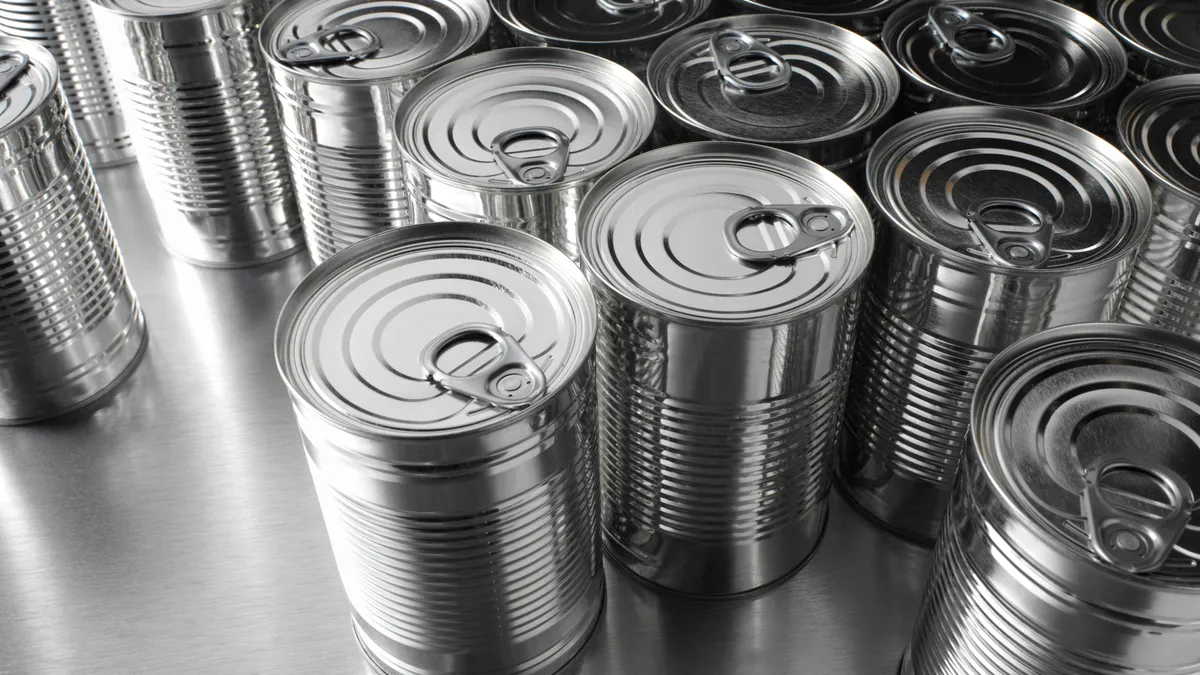President Joe Biden on Wednesday called on the U.S. Trade Representative to consider tripling the rate for certain tariffs on Chinese steel and aluminum imports.
Trade with China is a key political issue for Biden and former President Donald Trump ahead of the 2024 presidential election. The Can Manufacturers Institute says Biden should do more than tripling the current average tariff rate of 7.5% under Section 301.
“President Biden’s proposal on raising tariffs for Chinese steel and aluminum doesn’t go far enough. The U.S. metal can industry is threatened by steel and aluminum finished products from China, such as canned foods and the metal components to make cans,” CMI President Robert Budway said in a statement Wednesday. The industry group is especially focused on tin plate steel, a niche product used in making cans that constitutes a very small percentage of overall steel.
The Aluminum Association applauded Biden’s move to raise Section 301 tariff levels on Chinese imports of aluminum and steel, describing it as “the most appropriate action to directly target non-market behavior in China.”
“Unfortunately, China continues to engage in significant unfair trade activities, including massive state subsidies which hurt U.S. manufacturing and global carbon reduction efforts. This targeted tariff action by the Biden administration will help to counteract some of these challenges,” Charles Johnson, president and CEO of the Aluminum Association, said in a statement Wednesday.
Section 301 tariffs, currently under review by the USTR, are a holdover from Trump’s presidency. Steel and aluminum imports, including from China, are also subject to tariffs under Section 232 at rates of 25% and 10%.
The White House’s release Wednesday said that during Biden’s term, the Department of Commerce has imposed more than 30 antidumping and countervailing duties on steel-related products and conducted nearly as many investigations into “anti-competitive actions by Chinese exporters and efforts by countries like China to evade trade rules.” In January, the Commerce Department found that tin mill product imports from Canada, China, Germany and South Korea are being unfairly priced and such imports from China are also being subsidized. The dumping rate for China was found to be greater than 120%.
Budway also said Wednesday that the Biden administration “needs to take action now to save U.S. union jobs in the metal can and canned food industry by raising the meager duties on Chinese-made aluminum and steel can products before it is too late. Without action by the Biden administration, these vital industries will experience continued economic harm from imported products from China.”
Budway estimates that at least half of can plant workers are union workers. Looking at recent annual reports from U.S.-based public companies that are CMI members, Sonoco reports that 13.6% of its North American employees are represented by unions; Silgan Containers reports that 33% of hourly plant employees in the U.S. and Canada are represented by unions. Crown Holdings says a “significant portion” of its 25,000-person global workforce is unionized, with collective bargaining agreements covering approximately 10,600 employees, which would be about 42%.
Biden spoke at the United Steelworkers international headquarters in Pittsburgh on Wednesday. USW’s membership goes beyond steel to include workers in pulp and paper, glass and other sectors.
“By combining a firm stance on unfair trade with the work the administration has done on infrastructure, clean technology, microchips and more, President Biden is ensuring U.S. global competitiveness and widespread prosperity well into the future,” said USW President David McCall in a statement about Wednesday’s visit.
According to data CMI provided, imports of canned foods and other canned products “increased significantly” since Section 232 tariffs were imposed. The value of foreign imports of canned fruits and vegetables rose 44% between 2018 and 2022. Canned food imports from China increased 19% from 2021 to 2022. According to CMI, Section 301 duties on China were imposed concurrently with those under Section 232, but the can-making industry feels the Section 232 tariffs had a more resounding effect on tin plate pricing.















